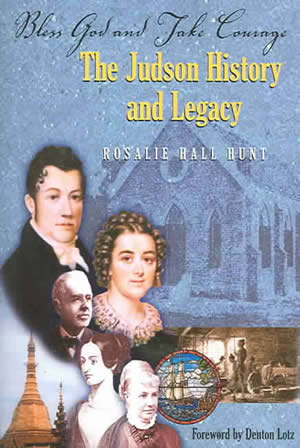
Bless God and Take Courage
Description : The story of Adoniram Judson, his wives, and his ministry in Burma stirs us every time we read it. Although the standard work on Judson’s life has been Courtney Anderson’s To the Golden Shore, this more recent work is worthy of consideration. The reader is constantly moved by the accounts of Judson’s sacrifice, hardship, suffering, and personal grief in the service of Christ.
Rosalie Hall Hunt grew up in China as a daughter of missionaries. She served in eight Asian countries. She spent six years researching the Judson history in the Unites States and Myanmar (Burma) as she prepared to write this book.
Hunt is apparently an American Baptist, and Judson Press, the publishing arm of the American Baptist Churches, published the book. This reviewer expected a “liberal spin” of Judson’s life. Early in the book this skepticism was allayed, but later in the book it was renewed.
Hunt divides the book into two divisions. Part One contains the first twenty-two chapters and is labeled “The Biography.” These chapters recount the story of Judson’s life. Hunt tells the story accurately and graphically. Three things are impressive in this part of the book. First, the author tells the story of Judson’s conversion and of the conversions of Burmese people with accuracy. She uses biblical language and seems to convey a real understanding of the new birth. Her forthrightness is commendable. Second, this book tells the story of Judson’s imprisonment at Aungbinle in graphic detail. Third, Hunt poignantly and tenderly tells the story of the three Judson wives. Emily is sometimes lost in the shadow of the end of Judson’s life in other biographies. Hunt describes her godliness and her motherly efforts to keep the Judson children together after his death.
Part Two of the book is named “The Legacy.” In this section Hunt traces the places of importance in the United States and Burma. She identifies the location of monu¬ments that commemorate the Judsons. She also recounts the sad story of most of the Judson children. Near the end of the book, Hunt writes three tender chapters on Adoniram’s three wives, Ann, Sarah, and Emily respectively.
The story of the six Judson children is a conundrum. Sarah Boardman’s son George pastored the First Baptist Church in Philadelphia for thirty years, apparently with great success. Judson’s youngest surviving son Edward was also a pastor, though he lectured at the University of Chicago and Union Theological Seminary. Hunt never says, but this reviewer conjectures that Edward, unlike George Boardman, was not a Bible believer. Abby Ann Judson dabbled in spiritism. Adoniram Brown Judson became a medical doctor. Elnathan was placed in a mental hospital, perhaps suffering from the effects of sunstroke. Little is known of Henry.
There is no doubt that the effects of separation from parents at a young age had a profound effect on the children. It would be easy to pass judgment on the Judsons for sending their children back to America at such young ages, but they knew from sad experience that death would likely claim them if they kept them in Burma. We ask ourselves what we would do, and that question is hard to answer.
It was disappointing to this reviewer, but not surprising, to read Hunt’s treatment of the remnants of Judson’s work today. She speaks in glowing terms of Emmanuel Baptist Church in Yangon. This reviewer was shocked to see three crucifixes hanging in that building. The pastor is a prominent spokesman for the World Council of Churches in Asia. Hunt treats this part of the legacy with the same positive note she treated the earlier accounts of conversions under Judson’s ministry.
The reader will learn things not revealed by Courtney Anderson’s book. Be advised, however, that you will need to read it with discernment.


